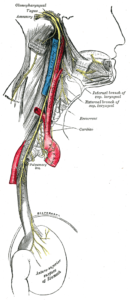Earth: Don’t worry be happy
Don’t worry, be happy.
How to soothe your nervous system:
- Take a cold shower or plunge
- Splash cold water on face & neck
- Sing, laugh, chant, hum, & hug
- Restore the microbe of the gut
- Relax jaw tension
- Meditate on loving kindness
- Positive Social Connect
 Stimulation of the vagus nerve plays an important role in the management of anxiety and mental health issues. The vagus nerve is the longest running cranial nerve in your body. It is one of ten paired cranial nerves and runs from the stem of your brain all the way down to your gut. The word “vagus” translates to “wandering” in Latin, and the vagus nerve certainly does that. As the longest and most complex of all the cranial nerves, it starts at the stem of the brain, behind the ears before it meanders down the sides of the neck, through the chest, and eventually ends in the abdomen linking the brain to the heart, lungs, throat, and gut.
Stimulation of the vagus nerve plays an important role in the management of anxiety and mental health issues. The vagus nerve is the longest running cranial nerve in your body. It is one of ten paired cranial nerves and runs from the stem of your brain all the way down to your gut. The word “vagus” translates to “wandering” in Latin, and the vagus nerve certainly does that. As the longest and most complex of all the cranial nerves, it starts at the stem of the brain, behind the ears before it meanders down the sides of the neck, through the chest, and eventually ends in the abdomen linking the brain to the heart, lungs, throat, and gut.
When we are in parasympathetic dominance we are able to rest and digest, rest and heal.
The vegas nerve is the sensory network that informs the brain of what’s going on in our organs, most specially the digestive tract (stomach and intestines), lungs and heart, spleen, liver, and kidneys.
People with good vagal tone can relax faster after a stress and are more capable of regulating blood glucose levels, reducing chances of diabetes, stroke and cardiovascular disease. Poor vagal tone, however, is associated with chronic inflammation and basket load of subsequent health issues. Recent research presented by the European League Against Rheumatism indicate that vagus nerve stimulation significantly reduces symptoms of rheumatoid arthritis.
Significant and important research has been making the news about a microbiota-gut-brain axis. Read up on this fascinating subject here. Also this article discusses the science behind gut microbiota, brain function and stress related disorders.
Relevant to Earth element health, I’ve collected these research links for you:
- Vagal mechanisms as neuromodulatory targets for the treatment of metabolic disease.
- Impact of blood glucose control on sympathetic and vagus nerve functional status in patients with type 2 diabetes mellitus.
- Vagal afferents contribute to sympathoexcitation–driven metabolic dysfunctions.
- Role of the vagus nerve in the development and treatment of diet-induced diabetes.

